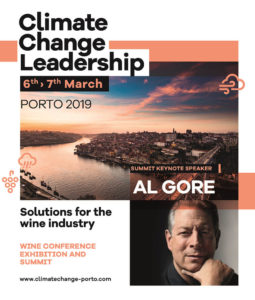The Porto Summit and Dr. Greg Jones
by Albert Letizia
This March 5-7, Porto, Portugal—one of Europe’s oldest and most precious cities—will host “The Porto Summit 2019: Climate Change Leadership and Solutions for the Wine Industry.” Nearly 600 wine growers, makers, educators, writers, and climatologists will descend upon the city for the event.
The summit will provide a setting for industry leaders to share experiences and solutions to ease the effects of climate change on viticulture, help the wine industry understand its role in climate change, and enable all sectors to reduce their carbon footprint.
The summit will also offer guidance from world-renowned climate change leaders like Al Gore.
Climatologist and Director of the Evenstad Center for Wine Education at Linfield College, Dr. Greg Jones, will also be speaking. In addition to his work as director and climatologist, Jones is a co-creator of The Porto Protocol and one of the earliest advocates for the summit.
Dr. Jones took a few minutes to speak with The Somm Journal.
SJ: In your own words can you explain what’s happening in March in Porto? How did you become involved?
GJ: I spent a yearlong sabbatical in Portugal helping them better understand and assess climate change impacts. And during that time, the idea for a Climate Change Leadership Conference for the Wine Industry became very important to the people I was working with. This also led to the idea that we could create a protocol, which people could follow in the wine industry, and also reach out to other industries that could follow as well.
SJ: So the Porto Protocol is like a Paris Climate Agreement for The Wine Industry?
GJ: That’s right. And I think the Protocol is really important because we need to be doing the right things in the right ways to be successful. We can’t be shooting in the dark.
SJ: Who is actually behind the summit?
GJ: Adrian Bridge, Leader of The Porto Protocol & CEO of Taylor’s Port along with 7 or 8 other individuals who have been on the planning committee. And I’ve been on that committee as well.
SJ: So if I’m a winemaker, what are the top things I can do to reduce my carbon footprint?
GJ: Going to a “no-till” framework is very important. Let the soil be more naturally absorbing of Carbon. By being better stewards of soil, we are helping to mitigate climate change. Another thing is to farm by doing fewer passes with the machinery. That’s not always easy, but there are ways in which you can approach it. Other things, of course, are to minimize the overall footprint of the winery operation and energy consumption. Gravity flow wineries are very popular because you can move wine from one place to another without using energy. Try to limit the overall removal of trees to plant vineyards. It’s a portfolio of actions that people need to look at from the vineyard to the winery to distribution to the public.
SJ: Why is it so important that the wine industry be a leader?
GJ: Well, if I was an ecologist and studying a salamander in a small watershed in Washington State and I talked about the impact of climate on that small salamander, people might not relate or care. But there’s something about wine. People identify with it easily. It’s got a connection to numerous aspects of life through art, history, geography, and of course it’s alcohol. It’s just a recognizable product that people identify with. Then on top of that, the wine industry is a very sustainable, agricultural sector and we’ve historically been looked at as the industry that should be greener over a longer period of time.
SJ: Are we going to see classic wine styles from classic regions permanently change due to global warming?
GJ: I have always said, that if what we know today is correct and climates warm to even half of what we’re projecting, then they will have to change.
SJ: So what do you hope the summit will achieve?
GJ: Well, what I’ve been doing since 1995 is helping people understand that we play a role in climate change, but also helping people understand what types of adaptation we can do both in agriculture in general and in the wine sector. So, what I hope to do, is continue the conversation that I’ve been having since the mid-’90s. Because if we’re not aware of the overall impact, then we can’t even begin to think about how we can become less vulnerable.
Other wine industry speakers to appear are:
Adrian Bridge, Leader of The Porto Protocol & CEO Taylor’s Port.
Cristina Mariani-May, President and CEO of Banfi Vintners.
Gerard Bertrand, Leading Biodynamic expert from the South of France.
Gerard Casaubon, Director of Research and Innovation, Concha y Toro.
Gilles Descôtes, Assistant Production Manager, Bollinger.
Katie Jackson, Proprietor and Senior Vice President, Jackson Family Wines.
Lga Barbosa, of the Wine Climate Change and Biodiversity Program, Chile.
Margareth Henriquez, President and Chief Executive Officer, KRUG.
Miguel Torres, President of Bodegas Torres.
For more information on The Porto Summit, go to www.climatechange-porto.com
